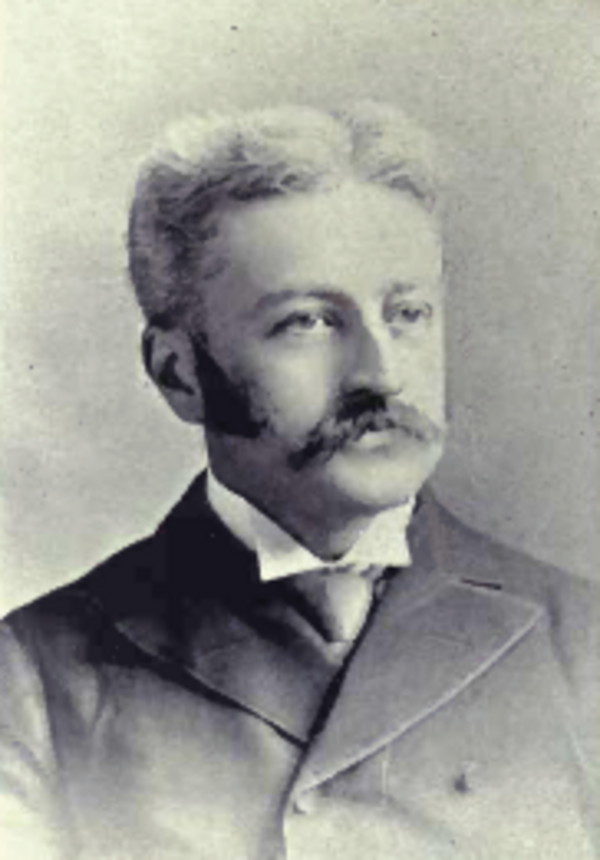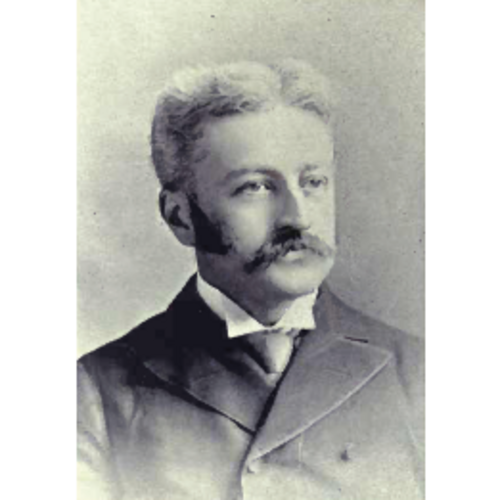
Source: Courtesy of Wikimedia Commons
FISHER, EDWARD, conductor, teacher, organist, and educational administrator; b. 11 Jan. 1848 in Jamaica, Vt, son of Dr Chesselden Fisher; m. 14 Aug. 1876 Florence E. Durgan of Boston, Mass.; d. 31 May 1913 in Toronto.
Born to American parents of English descent, Edward Fisher studied music in Worcester, Mass., before entering the Boston Conservatory of Music in 1867. His teachers included the violinist and composer Julius Eichberg, with whom he took harmony and counterpoint, and Joseph Bennett Sharland and Whitney Eugene Thayer, who taught him piano and organ respectively. Fisher was active in the Boston area both as a pianist, with the Boston Choral Union and the Newton Musical Association, and as an organist, at Second Unitarian and Phillips churches in Boston and at Eliot Church in Newton. He completed his musical studies in Berlin with Carl August Haupt (organ) and Carl Albert Loeschhorn (piano). In 1875 he moved to Ottawa, where he became music director of the Ottawa Ladies’ College, conducted the Ottawa Choral Society, and gave several organ recitals.
Subsequently, Fisher settled in Toronto. He served as organist of St Andrew’s Presbyterian Church from 1879 to 1899 and for some years was music director of the Ontario Ladies’ College in Whitby. Fisher soon expanded the St Andrew’s Choral Society into the Toronto Choral Society, which had from 150 to 400 singers, depending on the works to be performed, with an orchestra whose numbers were equally variable. He conducted the great works of the European choral repertoire by Handel, Haydn, Mendelssohn, Rossini, Gounod, Hiller, and Schumann. His rival as a conductor was Frederick Herbert Torrington, who led the Toronto Philharmonic Society, with a similar repertoire. In 1891 Fisher resigned from conducting the choral society in order to devote his energy to administration and teaching.
Although Fisher had considered starting a music school in Ottawa, he had waited until his move to Toronto to pursue this project. He managed to interest a number of prominent citizens in the undertaking, and on 20 Nov. 1886 the Toronto Conservatory of Music was incorporated. Of its initial capital of $50,000, about half was quickly subscribed, with Fisher himself investing $5,000. Opened in leased premises on Wilton Avenue on 5 Sept. 1887, the conservatory flourished for its first 26 years under Fisher’s direction. He was successful in engaging an excellent faculty and himself taught piano, organ, and theory. Instruction was given in two departments, collegiate and academic. The collegiate course, which took three years, was intended to train professional musicians; the academic classes met the needs of amateurs and those preparing themselves for the collegiate course. The TCM was affiliated with Trinity College from 1889 to 1904 and with the University of Toronto from 1896.
Fisher had attractive social qualities in addition to his musical attributes and had early charmed his way into Toronto society. An astute and tactful businessman as well, he appears to have had no conflicts with his board of directors, which initially consisted of George William Allan as president, John Alexander Boyd and George Albertus Cox as vice-presidents, and Fisher as musical director and secretary. His shareholders included Henry Mill Pellatt*, John Irvine Davidson*, and Robert Jaffray. The conservatory’s enrolment grew steadily and in 1897 it moved to a new building at College Street and University Avenue. Two years later it instituted the policy of holding examinations in centres outside Toronto. By the 1911–12 academic year the TCM had 2,040 students, with some 100 examination centres throughout western Canada and in Ontario and Quebec. The figures show the rapid growth of the conservatory’s examination system, which is still its most profitable division.
Although Fisher was a cultured musician who had continued to teach, he remains best known for his shrewd direction of the conservatory. It was his careful planning, attention to detail, and vision that guided its fortunes. His achievements had won him an honorary d.mus. from Trinity in 1898. In 1908 the composer Joseph Humfrey Anger called him “the Mendelssohn of Canada” in acknowledgement of his work with the TCM. The conservatory would outlive Torrington’s Toronto College of Music, founded in 1888 and the first music school to be affiliated with the University of Toronto (1890), and all other Toronto conservatories. Now the Royal Conservatory of Music – the designation Royal was granted in 1947 – it is the sole Toronto conservatory surviving from the 19th century.
Fisher died of heart trouble in 1913 after a two-month illness. A prominent Unitarian, he was buried in Mount Pleasant Cemetery following a funeral that took place from the conservatory. He was succeeded as director of the TCM by Augustus Stephen Vogt*.
The sources for the life of Edward Fisher appear in the author’s article “The Fisher years: the Toronto Conservatory of Music, 1886–1913,” Institute for Canadian Music, Three studies (Toronto, 1989), 59–145. See also Encyclopedia of music in Canada (Kallmann et al.).
Cite This Article
Gaynor G. Jones, “FISHER, EDWARD,” in Dictionary of Canadian Biography, vol. 14, University of Toronto/Université Laval, 2003–, accessed December 30, 2025, https://www.biographi.ca/en/bio/fisher_edward_14E.html.
The citation above shows the format for footnotes and endnotes according to the Chicago manual of style (16th edition). Information to be used in other citation formats:
| Permalink: | https://www.biographi.ca/en/bio/fisher_edward_14E.html |
| Author of Article: | Gaynor G. Jones |
| Title of Article: | FISHER, EDWARD |
| Publication Name: | Dictionary of Canadian Biography, vol. 14 |
| Publisher: | University of Toronto/Université Laval |
| Year of publication: | 1998 |
| Year of revision: | 1998 |
| Access Date: | December 30, 2025 |



